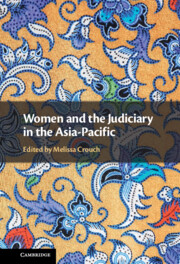Book contents
- Women and the Judiciary in the Asia-Pacific
- Women and the Judiciary in the Asia-Pacific
- Copyright page
- Contents
- Figures
- Tables
- Preface
- Contributors
- Abbreviations
- 1 The Feminisation of the Judiciary in the Asia-Pacific
- 2 ‘To Join the Bench and Be Decision-Makers’
- 3 Reframing Feminist Imperatives in Adjudication through a Reading of Sri Lankan Jurisprudence
- 4 Women in the Thai Judiciary
- 5 The Promise and Paradox of Women Judges in the Judiciary in Indonesia
- 6 Filipino Women Judges and Their Role in Advancing Judicial Independence in the Philippines
- 7 One Decade of Female Judges in the Malaysian Shariah Judiciary
- 8 Gender on the Bench Matters for Sustainable Development
- 9 Feminising the Indian Judiciary
- 10 Concluding Remarks
- Index
- References
7 - One Decade of Female Judges in the Malaysian Shariah Judiciary
Promises to Keep and Miles to Go
Published online by Cambridge University Press: 21 October 2021
- Women and the Judiciary in the Asia-Pacific
- Women and the Judiciary in the Asia-Pacific
- Copyright page
- Contents
- Figures
- Tables
- Preface
- Contributors
- Abbreviations
- 1 The Feminisation of the Judiciary in the Asia-Pacific
- 2 ‘To Join the Bench and Be Decision-Makers’
- 3 Reframing Feminist Imperatives in Adjudication through a Reading of Sri Lankan Jurisprudence
- 4 Women in the Thai Judiciary
- 5 The Promise and Paradox of Women Judges in the Judiciary in Indonesia
- 6 Filipino Women Judges and Their Role in Advancing Judicial Independence in the Philippines
- 7 One Decade of Female Judges in the Malaysian Shariah Judiciary
- 8 Gender on the Bench Matters for Sustainable Development
- 9 Feminising the Indian Judiciary
- 10 Concluding Remarks
- Index
- References
Summary
Malaysia has been on a long and rocky road for women to be appointed to the bench with progress only starting in the last decade. Not that long ago, a NGO Shadow Report commenting on Malaysia’s Report on CEDAW in 2005 described the number of female judge as ‘dismal’ in the civil and Syariah legal system. Women had to overcome significant challenges of being on the bench in the Syariah court system as a national fatwa prohibited women from being appointed as judges. It took over two decades for the National Fatwa Committee to overrule its previous decision allowing women to be appointed as Syariah court judges provided that they met the qualification requirements. In order for the fatwa to take effect in the individual states, it had to be passed by the respective states with some states declaring they would not pass it and other states remaining silent on this issue. Progress was initially very slow and by early 2016, only the five out of thirteen states allowed Muslim women to become Syariah court judges. By mid-2016 history was made when more states came around and women were also appointed to higher Syariah courts.
- Type
- Chapter
- Information
- Women and the Judiciary in the Asia-Pacific , pp. 209 - 234Publisher: Cambridge University PressPrint publication year: 2021



